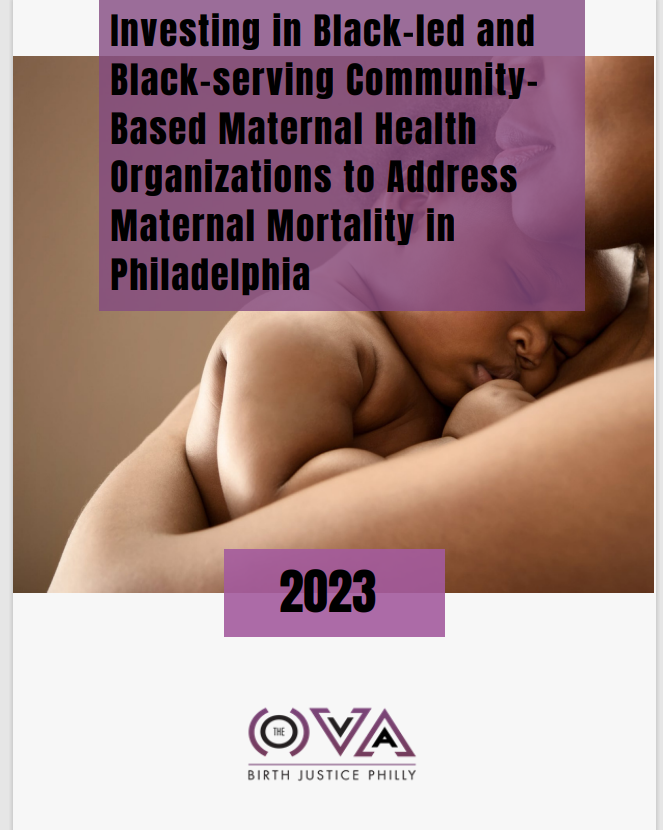Implementation Teams
Formed to carry out recommendations from the Philadelphia MMRC, Implementation Teams play a vital role in identifying and pursuing initiatives to improve maternal health in Philadelphia. Each team includes multidisciplinary perspectives, including women and birthing people, representatives from government agencies, healthcare professionals, community-based organizations, policy advocates and more. The current implementation teams are: Intimate Partner Violence, Community Investment, and Perinatal Substance Use Disorder.
Intimate Partner Violence
Intimate partner violence (IPV) is the third leading risk factor for maternal mortality in Philadelphia. The IPV Implementation Team includes stakeholders from domestic violence and sexual assault agencies, all local delivery hospitals, government agencies, lived experience experts and researchers. Successes and in-progress initiatives led by this team include updated IPV screening tools and protocols in all Philadelphia delivery hospitals, development of a specialized IPV screening training, and a wide-reaching public health campaign.
The OVA, in collaboration with the City’s Office of Domestic Violence Strategies, secured funding from the Office on Women’s Health for a 5-year project: Transforming Philadelphia’s Response to IPV and Sexual Violence in Obstetric Settings. This initiative seeks to bolster maternal mortality surveillance systems and enhance the capabilities of local delivery hospitals and emergency departments to effectively identify and respond to IPV and sexual violence, while also establishing infrastructure for a sustainable, city-wide coordinated response to IPV. The IPV Implementation Team provides strategic input and guides grant activities.
Resources
Community Investment
The Philadelphia MMRC's 2020 report identified tackling root causes of health inequities within the healthcare system as a priority, advocating for investment in Community-Based Organizations (CBOs) as a key strategy. Recognizing the pivotal role of CBOs in advancing maternal health equity, the OVA established the Community Investment implementation team to address this recommendation. The Community Investment team is comprised of people involved in maternal health spaces and with personal pregnancy and birth experiences. Following a comprehensive needs assessment conducted in 2022 which underscored the importance of capacity-building for ensuring sustainability for CBOs, the team launched a technical assistance mini-grant program, with the first cohort concluding in Spring 2024.
Community Investment 2023 Report
This report highlights the efforts of Organized Voices for Action (The OVA) Community Investment implementation team. Acknowledging the common experience of anti-Black bias among Black-led organizations and the communities they serve, the team conducted focus groups with Black-led maternal health organizations to learn more about their needs and ongoing challenges. The findings highlighted a need for capacity building and technical assistance support, both imperative to ensuring the sustainability of CBOs. This report outlines the focus group methodology, key findings, and initial recommendations for implementation.
Community Investment Mini-Grant Recipients
The Community Investment implementation team was awarded $20,000 from the Innovation Fund to launch a technical assistance mini-grant program to support Black-led community-based organizations (CBOs) addressing maternal health in Philadelphia. In the fall of 2023, our first grantees were awarded.
Perinatal Substance Use Disorder
The Perinatal Substance Use Disorder Implementation Team was created to address rising numbers of overdoses and substance-related deaths among Philadelphians. The team is comprised of a multidisciplinary group, including community-based organization leaders, birth workers, healthcare providers, and government officials. This team focuses on tailoring behavioral and mental health services for pregnant and postpartum birthing people with substance use disorder. The team aims to streamline care coordination, develop standardized referral protocols for pain management, and facilitate access to medication for opioid use disorder (MOUD), thereby improving maternal health outcomes.
The Perinatal Behavioral Health Access Line
The CareConnect Warmline has been offering connections to peer recovery specialists, referrals to resources like food, transportation, and medical needs, and same day MOUD prescription access to Southeastern PA every day from 9am-9pm since 2021. The expanded line will be offering enriched services for pregnant and parenting people and expert clinician-to-clinician consultation on caring for patients with substance use, perinatal substance use, and perinatal psychiatric concerns.
Call 484-278-1679 to be connected to care today!








